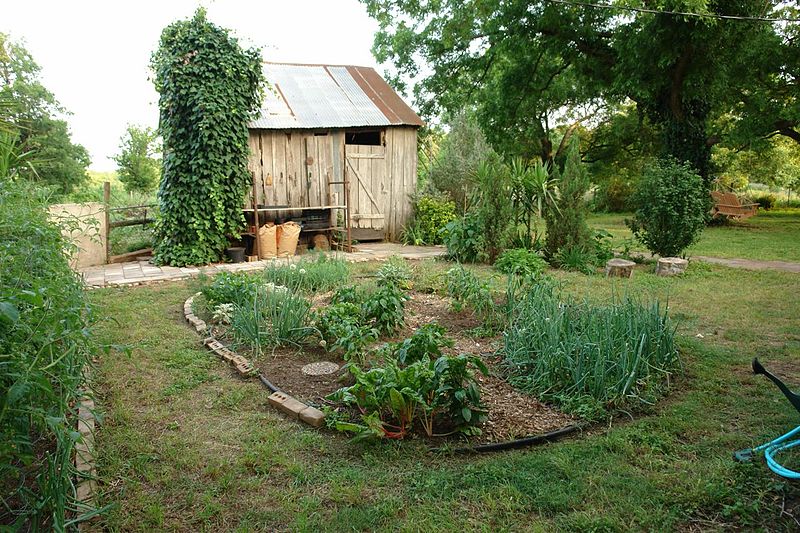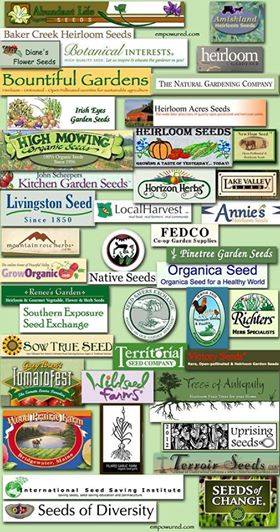Table of Contents[Hide][Show]

Seed catalogs for the upcoming growing season are arriving in mailboxes across the Northern Hemisphere with home growers everywhere starting to plan which seeds they will sow in freshly composted garden. A positive trend in recent years is the growing number of gardening enthusiasts choosing to plant gardens using organic and/or heirloom seeds.
What most of these home gardeners don’t realize is that corporate behemoth and GMO titan Monsanto has been gobbling up the seed market faster than a caterpillar can munch a tomato plant! With one fell swoop in 2005, Monsanto grabbed approximately 40% of the US vegetable seed market with its acquisition of Seminis.
This means that a home gardener could unknowingly be supporting the development and proliferation of genetically modified crops if the seeds used are from Seminis. In addition, Monsanto now apparently owns the trademark for many of the names of the heirloom seed varieties themselves!
Planting a sustainable home garden is much more than just choosing certified organic seeds and seedlings, eschewing pesticides/herbicides and using organic compost. This is because Monsanto has cleverly positioned itself to make money off the home gardening trend.
Does this mean that even if you buy organic or heirloom seeds from a completely independent company some of your purchase might be supporting the bad guys?
Yes, it does.
Surprise!
Home gardeners would do well to bone up on where to purchase their seeds so they aren’t inadvertently doing business with companies that maintain a working relationship with Monsanto-Seminis or were acquired by them.
Buying Organic or Heirloom Seeds Without Supporting Monsanto
Here are the recommended steps for the 2014 growing season for those who want to truly strike a blow for sustainability in every way with their home gardens:

Avoid buying from the seed companies affiliated with Monsanto. Here’s a list of these seed companies by location (enter you zipcode for a list of dealers to avoid).
- Buy from companies Monsanto HASN’T bought and are not affiliated or do business with Seminis: The graphic above indicates numerous companies that are worthy of your patronage as compiled by the International Seed Saving Institute. Please note that this many not be a complete list. If your seed company does not appear, just be sure to clarify with the owner about any potential affiliation with Monsanto-Seminis before buying from them.
- Avoid buying heirloom varieties for which Monsanto owns the trademark.
- Ask seed companies if they have taken the Safe Seed Pledge. Here’s a list of companies that have taken the Safe Seed Pledge and believe in responsible plant genetics. These are good companies to buy from.
Background on Monsanto’s Quest for World Seed Domination
Monsanto’s corporate quest is clearly to make money on each and every one of us whether we choose to eat supermarket frankenfoods produced with abominable, patented GM crops or carefully plant and tend an organic garden at home. Here’s some background information on the subject you may find interesting as well as enlightening:
If you are a home gardener and have information to contribute regarding these steps, please add to the discussion in the comments section. Also, please spread the word via gardening forums you may participate in that folks need to be very careful when seed sourcing for their spring gardens this year else they might be unknowingly supporting Monsanto.
Let’s make this the year when Monsanto’s grip on the worldwide seed market loosens and the movement to seed sustainability gains momentum!
Update
The day after this article was originally published in 2013, the CEO of a large GMO soybean seed company in the Midwest emailed me complaining that the article was short-sighted and insisting that Monsanto is helping feed the starving people of the world. He even went so far as to say that GMO crops are “proven safe”. Click here for the text of this CEO’s entire email plus my written reply.
I have also received email complaints from two other seed companies, one in Canada and one in Arkansas, that do business with Monsanto-Seminis and were offended by what they viewed as inaccuracies in the post. In response, I have adjusted the text slightly and moved linked sources to within the text rather than only listed at the end to make the message of the post as clear and precise as possible so as to not result in any consumer confusion over the information.
I have received no complaints about this article from seed companies completely independent of any affiliation or ties to Monsanto-Seminis.
More Information
Why I Avoid Organic Hydroponic Produce
The Hydroponic Invasion of USDA Organic
Heirloom vs Hybrid Produce
Photography Credit








The list of companies Monsanto has bought out is wrong. They did not purchase T & T Seeds of Winnipeg – it is a family owned company and has been for over 60 years. I wonder how many other seed companies listed shouldn’t be on the list.
Actually, it isn’t the list that is wrong, it is what you said about it. You said it was a list of companies that have been bought out by Monsanto, but in fact it is a list of companies that distribute or supply Seminis seeds (Seminis is owned by Monsanto). Your statement in the “Four Steps Required” is misleading.
Also, just for information’s sake, T & T Seeds says they do not sell GMO seeds.
I see that you have changed your wording. That’s good. It is very important to be careful not to spread misinformation. It damages one’s credibility.
Thank-you Robin – as a seedsman it is hard to believe people belive the worst of a company based on a blog so flawed. I have spent countless hours defending our company – which was one of the first to sell untreated and organic seed in Canada. It bothers me people do not check facts. Sarah will not comment on this so I would imagine she is not credible.
I would like to thank Sarah for posting my rebuttle to facebook. This is a first step to fair open dialogue.
Do you buy seeds from Seminis? If so, you are supporting Monsanto and, therefore, I would boycott you if I was buying seeds in Canada. If you are not purchasing seeds (non-GMO or otherwise) from any company owned by Monsanto, then I would support you whole-heartedly.
Hey everyone! Most all vegetables are NOT genetically modified! Sugar beets are and certain corn. Otherwise, you cannot buy genetically modified vegetable seed even directly from Monsanto. That is never a problem at this time. Eat all the fresh vegetables you can get your hands on.
Monsanto has bought a company that sells vegetable seed grown buy many, many individually owned seed producers. These seed growers are not owned buy Monsanto and no one grows GMO vegetables. If you refuse to buy seed that was bought from a company owned by Monsanto because you want no money going to Monsanto, you may be hurting these small independantly owned seed growers. Give them time to find another place to sell their seeds before you put them out of business. They never intended to sell their seed to Monsanto. Seminis was a good company that thankfully supported small independently specialty growers that produced heirloom and organic seed.
That makes me think that no matter how perfect we are trying to be about what we eat and how we grow, we don’t live in a perfect world and looks like its not getting any better. We can certainly try our best, only for how long…before big corporations will start taking over.
My question is, besides the seeds that are labeled organic but are not, what about our food in the grocery store, even if it has organic label that means it really isn’t?
Buy from this list of companies Monsanto HASN’T bought:
interesting.i try this link 3 times and it wont open. have they gottin to it so we can’t find out.
got it to open
Read Fedcoseeds.com They are totally anti-Monsanto. I’ve ordered from them for years now. Excellent
I’m loving learning about all of the things Sarah discusses here!
Does anyone have links to videos or articles that explain the basics of who Monsanto is, what GMO is and how it changes things in the food world, or any other food- related info that’s not really “common/advertised knowledge”?
I want to be able to explain the basics to others and send them quality info to research! Thanks!!
There is a video on You Tube called Food, Inc. I also reccommend reading the book “Seeds Of Destruction”. That pretty much explains how this whole GMO process started.
Thanks!!
Links on GE and GMO
The link for heirloom companies that have NOT been bought by Monsanto is broken.
thank you thank you thank you. i hadn’t given it a thought yet who i was going to purchase my seeds from
I do a lot of research before buying seeds. Something is telling me not to trust Burpee. I tried a little garden last summer. It was doing pretty good, until my dogs got to it.
Johnny Seeds sells Burpee Seeds and when I called about the seeds they could not tell me for sure if they were not GMO
Johnny’s is on the safe seeds pledge list. Does that mean something good in relation to the issue of non-GMO? I wonder if it was a matter of whom you spoke with (….I say hopefully as the Johnny’s catalog is one of my faves.). I was checking the lists for their company but didn’t find it in either of the first 2 linked lists.
Yay, Pinetree is on the good list! For beginner and long-time gardeners alike, this is a great catalog with tons of variety and cheaper prices.
Richter’s herbs is another favorite because they have things you will not find elsewhere. I’ve learned a lot from these two companies just by reading their catalogs cover to cover.